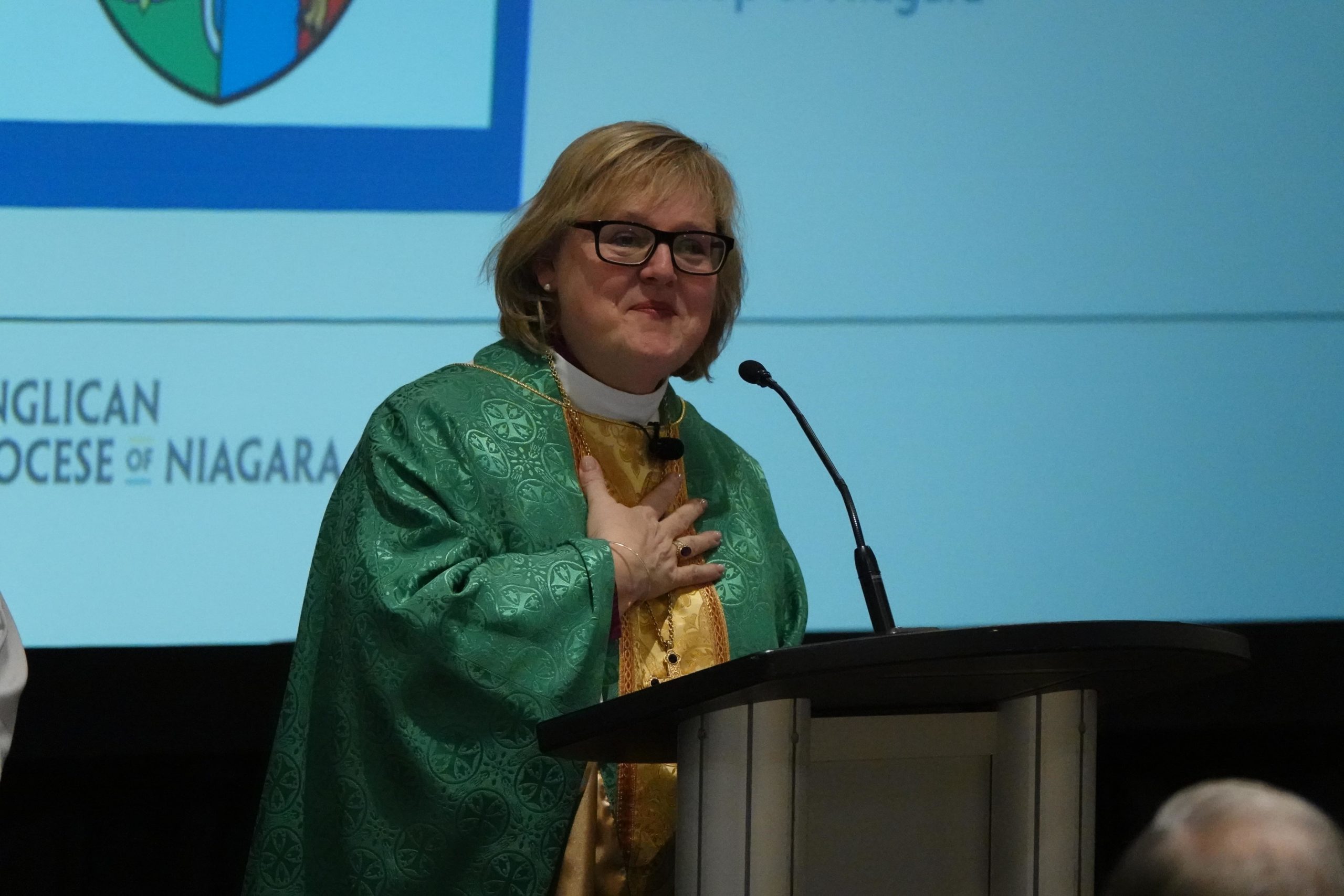Nearly 250 people from across the diocese gathered for the 148th Synod of the Diocese of Niagara with theme “God Church for God’s Mission.”
The Synod of the Diocese of Niagara is an annual meeting in which elected parish delegates, both clergy and lay, and other representatives discern together on mission and ministry in the Diocese of Niagara, which normally includes financial updates, changes to canons and policies, and the governance of the diocese. This year, Synod was convened online for the evening of November 4 and in-person during the day of November 5, at the Burlington Convention Centre.
Bishop Susan Bell delivered her charge to Synod, encouraging Synod members to “cast their anxieties on God” and that as people of faith “we expect God to act.” In her charge, Bishop Bell addressed the challenges of this present time, including the slow growth of attendance as parishes return to in-person worship, and the lower-than-expected revenues forecast for 2023, both at the diocesan level and in individual parishes. At the same time, the bishop pointed to several new ways at which God is at work through the diocesan Mission Action Plan, such as the Niagara School for Missional Leadership. “In this liminal space of discontinuous change – in this time of great anxiety and anguish for the future of our Church, we have been working carefully, intentionally, expectantly and following our MAP through the present and on into the future.”
Synod members also heard presentations about God’s flourishing mission in a variety of contexts: Susie Kim, a missioner in Hamilton, spoke about the importance of being known in neighborhoods, encouraging all Christians to be visibly present, and in relationship with those in their communities. The diocesan Anti-Racism Working Group, led by Naomi Kabugi, spoke about the upcoming launch of diocese’s Anti-Racism Curriculum, featuring six sessions. Renée Anderson and Brian Galligan invited members of Synod to the join Niagara-Huron Cursillo movement, a ministry which helps Christians explore and live the fundamentals of being Christian. Sharon Miller, director of Canterbury Hills Camp, shared stories about a vibrant season of ministry over the summer months and what is in store in the coming year.
Sue Carson spoke about the urgency of action on the climate crisis and the important work of Climate Justice Niagara. She noted that 14 churches are in the process of conducting walk-through energy audits, with an aim to reduce greenhouse gas emissions by 10 per cent in five years. This initiative has become a national endeavour under the banner, Net Zero Churches.
Synod members also heard from Canon Christyn Perkons, director of congregational support and development, and Emily Hill, parish development missioner, who spoke about the Mission Action Plans for both the diocese as well as parishes. At the end of the presentation, Bishop Susan Bell took a moment to laud Canon Perkon’s 20 years of “faithful and extraordinary ministry” in Niagara as she prepares to retire in the new year; Synod members responded with a standing ovation.
This year, the Synod of the Diocese of Niagara hosted Archbishop Anne Germond, metropolitan of the Ecclesiastical Province of Ontario. She brought greetings to the Synod on Friday evening in which she encouraged the Diocese of Niagara to remember the “long and varied history and vital place” the diocese holds in the wider Church.
Speaking about the Niagara School for Missional Leadership, the archbishop reflected on the growing and important role within other dioceses. “Its impact is further reaching, extending to the dioceses of Algoma and Moosonee with lay and ordained registered and participating in it,” said Archbishop Germond.
On Saturday afternoon, in one of the highlights of the Synod, Archbishop Germond and Bishop Bell reflected together on their shared experience at the recent Lambeth conference, a gathering of Anglican Bishops from around the globe, which recently met over the summer.
Archbishop Germond encouraged members to remember that “you as a diocese are a gift to our Church,” through the leadership of Bishop Susan Bell, the countless gifted clergy and lay who “are all doing their part to build up the body of Christ.” Even the very geography of the Diocese of Niagara, Archbishop Germond urged, was a gift, including the resources available as a result.
Towards the end of Synod, members passed the 2023 diocesan budget, representing an investment of 3.6 million dollars in ministry. Nearly 80 per cent of parishes assessed using the three-year rolling average for their Diocesan Mission and Ministry (DMM) contributions will see a reduction in their 2023 DMM compared to 2022. An incentive for parishes completing their parish Mission Action Plan will also continue to support parishes to bring new missional initiatives to life.
Synod elected the following members to the roles of regional representatives to Synod Council: Patricia Davis (Brock), Anne Gould (Greater Wellington), Bev Groombridge (Hamilton-Haldimand), and Byron Nicholson (Lincoln). Additionally, Synod elected Fran Wallace and Canon Sue-Ann Ward (clergy), and David Montgomery (lay) as representatives from the Diocese of Niagara to the Corporation of Trinity College, for a two-year term.
After giving her assent to the actions of the Synod, Bishop Bell gave thanks for all who contributed to making it a Spirit-filled gathering, especially members of Synod to who she reiterated words of gratitude from her charge, “I thank God for all of you constantly. Your service, your commitment, and your presence as the Church is what it’s all about… You are beloved.”

Disability Theology and it’s Promise for our Church